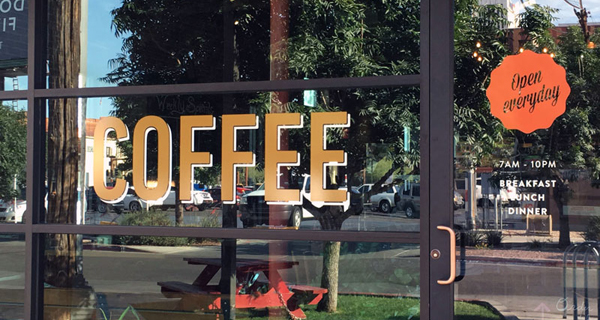Late on a Sunday morning, Lola Coffee Bar can expect an eclectic group of people, from college students gathering to gossip, to businessmen meeting to discuss the week ahead, to dedicated readers with books open on their laps. The dining area is small, with several community-style tables that brings all of these different people together.
A few people sit in the armchairs by the window, and several sit on the other side of that window, enjoying the weather that Phoenix is so well known for. There’s a small patio in the back that borders the Pita Jungle next door, along West Roosevelt Street, and when all the spots in front are full, the overflow comes out here.
The baristas behind the counter smile and chat with everyone, whether they are the college students or business people or readers.
“I feel like when people walk in, most people that are new to it are like, ‘Oh, this is like a little hidden gem’,” said Lola manager Kristina Bracamonte.
Lola is gaining recognition for its strong iced coffee, decadent cappuccinos and friendly atmosphere. In downtown Phoenix, Lola is becoming as synonymous with coffee as green aprons and red cups.
According to Statista.com, Americans spend an average of $21.32 on coffee each week, and while most of that money goes toward Starbucks, the No. 1 coffee retailer in the country, there has been a rising trend lately toward independent coffee shops. While cities like Portland and Seattle top the list of cities known for their unique and thriving coffee cultures, Phoenix has seen its own independent coffee scene begin to take center stage.
“Downtown has never had this kind of growth in its history,” said R.J. Price, the vice president of marketing and communications for Downtown Phoenix Inc. Price said that over the last five years, downtown Phoenix has added 60 new restaurants, including many coffee shops.
“They are huge galvanizers of the community. They are third spaces. They are places where people want to go and do business meetings, they want to go and get to know their neighbors,” Price said. “I mean, they’re just huge community drivers.”
Be Coffee+Food+Stuff is one such community driver. The coffee shop sits inside monOrchid, a renovated warehouse that is also home to an art gallery, co-working space and an event venue. Located in the heart of the Roosevelt Row district, Be Coffee is known for its friendly staff and generous portions.
Kevin Sinnott, who runs The Coffee Companion, an online publication dedicated to the world’s best coffee, said that in addition to social aspects, independent coffee shops also offer quality. Sinnott has also written two books on coffee and produces “Coffee Time,” a consumer coffee event that travels across the country.
Sinnott said that while giants like Starbucks and Dunkin’ Donuts offer consistency, independent coffee shops are more likely to offer quality.
“I want to drink coffee that has been roasted within two weeks,” when the beans are at their peak, Sinnott said. Because corporate coffee houses tend to get beans from a warehouse roastery, it “almost presupposes on going to find a local place,” he said.
Sinnott said independent coffee shops have an advantage over corporations because they have the opportunity for craft brewing. The idea behind craft brewing coffee is similar to that of beer: the more time it takes, the better, usually.
“Craft brewing … that’s just not practical for places like Starbucks or Peet’s,” Sinnott said. “It’s not practical for their blueprint.”
Sinnott explained that the business model of corporate coffee houses does not allow for each store to assign a specific barista to each machine, and many have installed automated machines to allow for the barista to focus on getting more drinks out, more quickly.
Meanwhile, independent shops like Be Coffee have to take the time and care to make sure they pull the perfect shot, he said, as they don’t have the machines on their side.
Sinnott said that the automated machines do offer a consistency that some consumers truly cherish. That consistency is part of the appeal of places like Starbucks, he added.
“That’s what Starbucks really specializes in and promises,” Sinnott said.
He also said that a small shop does not mean the product is automatically better.
“Through the years I’ve occasionally visited local places that are not only as good as Starbucks but are actually inferior,” he said. “They’re not knowledgeable to do everything right.”
However, local coffee shop owners say that what they lack in consistency, they make up for in customer loyalty.
“Our customer loyalty is a lot different than a Starbucks chain,” Bracamonte said.
Bracamonte has managed the downtown Lola Coffee location for two years. Prior to that, she spent almost a year managing the shop’s airport location in Terminal 4, surrounded by multiple other local eateries, such as Joe’s Real BBQ. Bracamonte said that the downtown Phoenix location certainly sees more consistent regulars, and that there is a sense of friendship about them.
“It’s pretty cool because whenever we’re out, somebody will always be like, ‘Oh, how do you know that person?’… ‘From Lola,’” Bracamonte said. “That’s cool.”
“I think the coffee purveyors who get it are the ones who want to be a part of the community,” Price said. “They want to have and establish a really strong regulars clientele. They want to be seen as a place where people have their business meetings … They want to be a part of the fabric of the downtown culture.”
Community factors in to the success of coffee shops in downtown Phoenix, and customers do not appear to have any issue with the level of knowledge that the downtown shops have. It takes scrolling through 27 coffee shops on Yelp before finding one in the downtown Phoenix area that is rated with less than four stars… and that first less-than-four-star rated joint is a Starbucks.
Sinnott said that coffee culture and economics often go hand in hand, especially when it comes to independent shops. “We’re really in a time of consolidation,” he said. “The coffee chains are blowing up so they’re more corporate than they were … Right now it’s sort of business as usual, but long term it has to change. It has to be simplified.”
Smaller shops are already simplified, he said. There are no corporate standards or rules. And there’s a level of personality that cannot be matched.
Jobot Coffee in the Roosevelt Row district of downtown Phoenix is particularly known for its personality.
“I like that Jobot is not a pretentious place at all,” said Jenn Bottenstein, a barista at the shop.
Beyond its coffee, Jobot is widely praised for its crepes, people and involvement in the local community.
“Joe Sagasta owns two other businesses on this street,” Bottenstein said. “So everyone knows each other. Everyone says what’s up every day… Roosevelt Row is just a very supportive community overall. I think everybody downtown is happy to see this neighborhood thriving.”
By Taylor Nelson, Cronkite News




